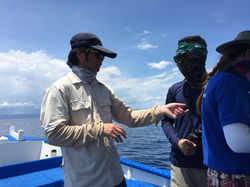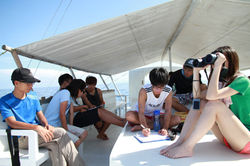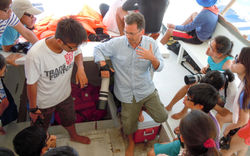top of page

Academic Teaching
BIOL 4451 Marine Mammal Ecology & Conservation Field Course
Marine Mammal Field Course 2017 (Cebu, Philippines)


Marine Mammal Field Course 2017 (Cebu, Philippines)
04:39
Play Video

Marine Mammal Field Course 2012 (Bohol Sea, the Philippines)
03:23
Play Video
This course represents a capstone requirement and experiential learning opportunity; it offers a unique hands-on experience in field research of ecology and conservation of free-ranging cetaceans. Conducted in a remote field location in central Philippines, with many hours out at sea, this course provides students with a fundamental knowledge, skills, and the appreciation of what it takes to design, implement, and effectively run field studies of highly mobile and wide-ranging animals such as dolphins and whales. During numerous discussions and group debates, we explore the similarities and differences with similar studies of other large marine vertebrates, and studies of other large mammals.
Photo Gallery
 Students searching for dolphins |  Students at sea learning marine mammal research techniques |
|---|---|
 Students at sea learning field research technique |  Stephen Chan taking photos at dolphin |
 Spinner dolphin mom and calf leaping (Photo by Katrina Perandos) |  Students checking dolphin photo-IDs |
 Spinner dolphin in Tanon Strait (Stenella longirostris longirostris) (Photo by Stephen Chan) |  Risso's dolphin (Photo by Angelico Tiongson) |
 Signature behaviour of spinner dolphin - spinning (Photo by Derek Ho) |  Smily faces after fieldwork |
 Risso's dolphin mom and juvenile (Photo by Stephen Chan) |  Searching for dolphins during line-transect surveys (Photo by Stephen Chan) |
 Pantropical Spotted dolphins leaping (Photo by Angelico Tiongson) |  Pantropical Spotted dolphin high leap (Photo by Katrina Perandos) |
 Marine Mammal Field Course - YEAH!! |  Melon-headed whale (Peponocephala electra) - mom and calf (Photo by Stephen Chan) |
 Marine Mammal Field Course 2013-14 in Bohol Sea |  Marine Mammal Field Course 2016-17 in Tanon Strait |
 Launching survey in early morning (Photo by Stephen Chan) |  Heavily armed photo team |
 False killer whale in Tanon Strait (Photo by Teghan Shore) |  Dr. Harry Lin demonstrating hydrophone to students |
 Excited students on board (Photo by Stephen Chan) |  Dr. Harry Lin explaining acoustic samping procedures |
 Dolphin encounter |  Dolphin encounter during Photo-ID survey (Photo by Stephen Chan) |
 Discussion with Prof. Leszek on boat (Photo by Stephen Chan) |  Discussing acoustic research with Dr. Harry Lin |
 Cool Prof - Leszek chilling (Photo by Stephen Chan) |  Close encounter with melon-headed whales |
 Close encounter with melon-headed whales 2 |  Bonus 3 - Crystal water |
 Blue whale outside Dumaguete (Photo by Hans Seiter) |  Bonus 2 - Housing at beachside |
 Bonus - Stunning scenary |  Field learning 2 |
 |  |
 Discussing research during line-transect surveys at the 1st experiential field course, Philippines 2 |  Discussing ideas and science during evening debates |
 Cetacean ecology Filed Course, Philippines 2012 |  Class of 2012 - our 1st experiential field course in the Philippines |
 Discussing data analyses, Philippine field course |  After the last survey of our 1st experiential field course, Philippines 2012 |
 Eager photo-ID photographers, Philippines 2012 |  Field class, Philippines 2012 |
 Our 1st sea-based class, Philippines |  Prof Leszek and undergraduate students discussing research ideas out at sea, Philippines 2012 |
 Stephen explaining data sheet design |  Searching for dolphins in Bohol Sea, 2012 |
 Prof Leszek and undergraduate students discussing cetacean ecology, Philippines |  Our floating classroom, Philippines |
 Our field camp, Bohol 2012 |  Students practicing Photo-ID data collection |
 Time for a bit of relax, Philippines 2012 |  Students reviewing their data onboard our floating classroom |
 Animal Behaviour Field Course |  Marine Mammal Field Course |
|---|---|
 Marine Mammal Classroom Course |  Animal Behaviour Classroom Course |
 Students' Corner |
(To select courses, click on the animals below)
CETACEAN ECOLOGY LAB
The Swire Institute of Marine Science, The University of Hong Kong
bottom of page


